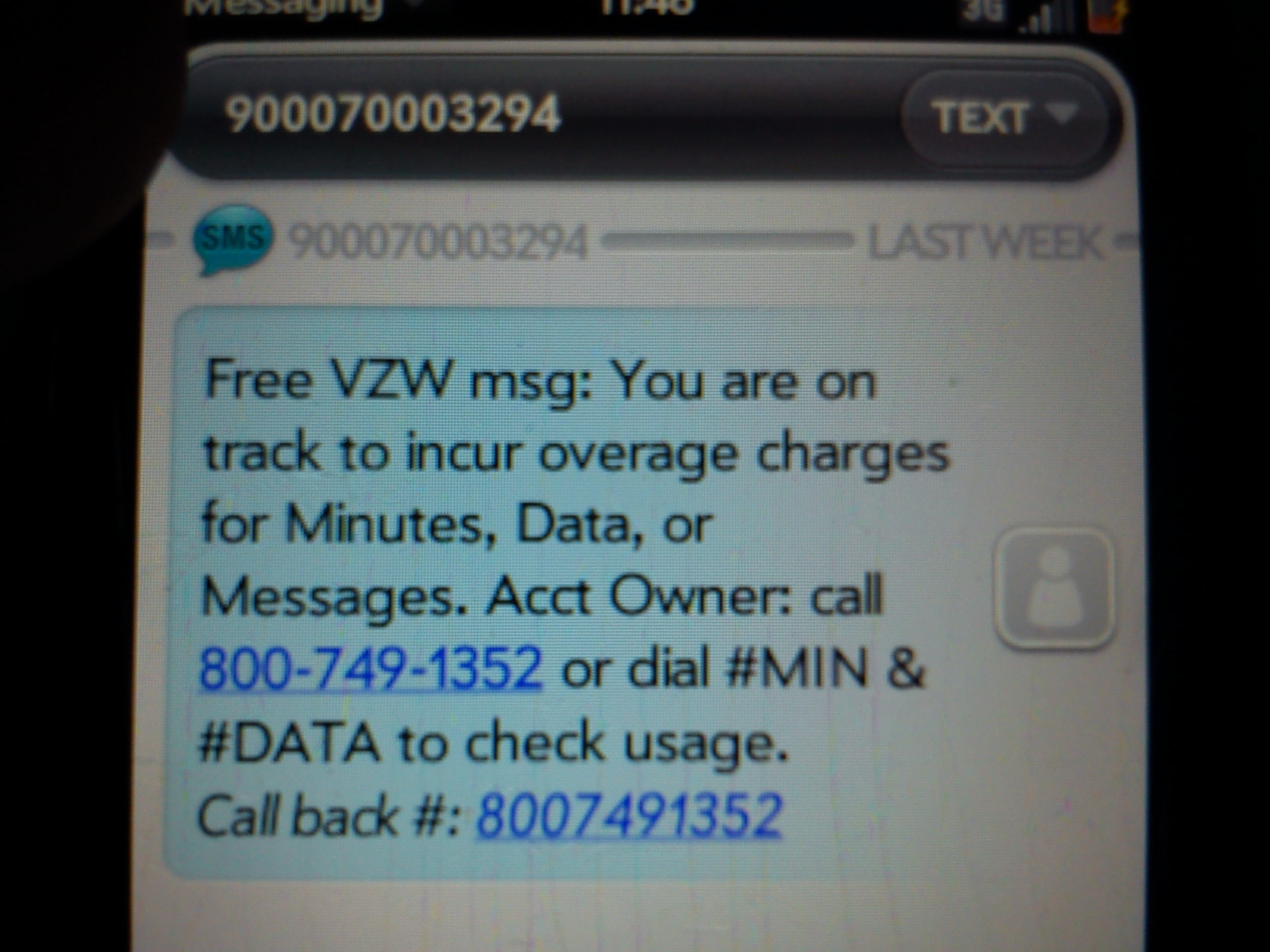Wireless Carriers Now Sending Usage Warning Texts
Wireless carriers have agreed to end "bill shock" by sending texts to customers warning of overages and possible fees.

Just the other day my wife received a text message from Verizon Wireless saying that we were "on track to incur overage charges" for the month. This was the first time we've received a warning like this, so we called Verizon to see if it was bogus and discovered that my oldest son had actually consumed most of our monthly minutes. Because of this, the damage had already been done as the message indicated, and we were way over the limit, facing additional fees.
According to the L.A. Times, Verizon, AT&T and other cell major cellphone providers have reportedly agreed with U.S. regulators to end bill shock by sending warning text messages to subscribers who are approaching monthly voice, text and data limits.
The agreement has thus helped produce a new set of voluntary industry guidelines called the Wireless Consumer Usage Notification Guidelines aimed to avoid the threat of new government regulations, and includes warnings about situations like my own where we've exceeded the plan's limits and face overage charges. Customers will also receive warnings when traveling overseas and are about to incur pricey international roaming fees.
The agreement arrives just as wireless carriers move away from the unlimited data plans, charging customers for limited packages of data for hefty fees. FCC Chairman Julius Genachowski is expected to officially reveal the carriers' guidelines Monday at a news conference with the head of wireless industry trade group CTIA and an executive from advocacy group Consumers Union. These guidelines should be in place within the next 18 months although from personal experience it looks as if Verizon has already set the warnings system wheel in motion.
"Far too many Americans know what it's like to open up their cellphone bill and be shocked by hundreds or even thousands of dollars in unexpected fees and charges," President Obama said in a statement. "Our phones shouldn't cost us more than the monthly rent or mortgage."
Steve Largent, president of the CTIA, said the new guidelines are the "perfect example of how government agencies and industries they regulate can work together … to consider whether new rules are necessary or would unnecessarily burden businesses and the economy." The new guidelines will be included in the CTIA's existing consumer code which also demands accurate coverage mapping and giving customers 14 days to cancel a service without having to pay early termination fees.
Monday FCC officials said that the nation's four largest carriers -- Verizon, AT&T, Sprint and T-Mobile -- will follow the new bill-shock guidelines. Other wireless carriers including US Cellular and Clearwire have also signed on to follow the guidelines. Participating companies have agreed to apply any two of the four alerts within 12 months, and all four within 18 months.
Get instant access to breaking news, the hottest reviews, great deals and helpful tips.
"Regulations, no matter how well-intentioned, simply cannot be as flexible and responsive to consumer needs as a self-regulatory code," CTIA said.
UPDATE: Verizon just sent over this press release "applauding" the new policy of usage alerts:
CTIA-The Wireless Association announced on Monday (Oct. 17) that wireless companies have agreed to a standard set of guidelines for sending notifications to help wireless consumers avoid unexpected overage charges. These "Wireless Consumer Usage Notification Guidelines" give consumers free alerts, which subscribers will not have to affirmatively sign up to receive, to help prevent overages and potential additional charges for data, voice, messaging and international roaming services.
"Verizon Wireless has a long-standing commitment to provide customers with the tools they need to manage and monitor their wireless lives," said Kathleen Grillo, Verizon senior vice president for federal regulatory affairs. "The new CTIA usage-notification guidelines announced today are a win for consumers. For the first time, the industry has adopted a common standard for all wireless providers to expand usage-management tools for consumers. Verizon already offers customers a number of helpful free alerts and controls for usage-based data plans, and we’re pleased that the industry took the initiative to empower consumers with more information.
"Chairman Genachowski deserves credit for raising the industry’s awareness of the value of more usage alerts. He encouraged the industry to address usage alerts in a manner that recognizes that innovations in the wireless world develop quickly. The result is an industry code that will serve consumers better than rules that would soon be outdated, and that is responsive to President Obama’s request that federal agencies avoid imposing unnecessary regulation on businesses when a nonregulatory solution is available. We hope that in the future this industry effort serves as a model for the communications space."
Kevin started taking PCs apart in the 90s when Quake was on the way and his PC lacked the required components. Since then, he’s loved all things PC-related and cool gadgets ranging from the New Nintendo 3DS to Android tablets. He is currently a contributor at Digital Trends, writing about everything from computers to how-to content on Windows and Macs to reviews of the latest laptops from HP, Dell, Lenovo, and more.
-
zak_mckraken Good initiative. We seldom see a communication company with an honnest business practices. Well, this time...Reply -
The Greater Good yer__mommaI have Sprint, what is this "coverage" you speak of?Reply
Fixed that for ya.
-
JOSHSKORN It's about time. Maybe if a wireless company had a brain, it could've pitched the idea "We'll tell you when you're low on texts" as a way to lure in customers.Reply
I'm kind of curious if you're able to have more control on a family plan. Lets say, your oldest son took all of the text messages from the family plan of a given pay period. Can you then limit him for the rest of the month to only sending text messages to other members on the family plan, or other certain users (i.e. other family members or very close family friends)? That is, for the rest of the billing period, limit him from sending nonsense messages to his friends like "what did you eat for dinner?", "How was your date?" and so forth. -
ThisIsMe Well, at least with at&t you get unlimited calling to and from any mobile phone when you add unlimited messages to your family plan. That should keep most kids in check.Reply
BUT, I've long said that if a provider is to charge for a limited amount of usage, then that provider should offer an option to have that specific service deactivated when that limit is reached until the next billing cycle begins. That way they cannot use the threat of lowering someone's credit score and their lawyers to force someone to pay for something they never intended to purchase in the first place. I mean seriously, pay phones were doing this a long time before cell phones were even close to becoming real. You put in your dime/quarter and you talk until you run out. That's it. Also, I remember when pagers were kind of a big deal and when you bought your monthly quota, that was all you got. If you ran out of pages you got cut off until you bought more or the billing cycle started over. So, it's not like the systems can't do this. It's not like it would cost them more to impliment it. They just like getting that accidental extra income, and it's obvious. -
ThisIsMe jacekringWonder if the txt alert you get counts against your txting plan if you have a limited plan.I'm pretty sure that the Free VZW msg: at the beginning of the text indicates that it's a free Verizon Wireless message, but maybe that's just me.Reply -
Why is the US gov working with these crooks and their bogus fees rather than forcing them to be more competitive and not charge 10,000% more than it actually costs to send a text message or use any significant amount of data.Reply
-
house70 How about this: cut back just a little bit on the outrageous CEO compensations and with that money build more infrastructure, so we can all get the unlimited services that the rest of the civilized world enjoys already. And for the govt. regulations, if they really want to do something helpful, they need to break down those quasi-monopolies that telcoms have created by fragmenting the market amongst themselves and bring back true competition.Reply -
leper84 Tmobile has been doing this for awhile, near the end of every month when I'm about to hit my 5gb slow down cap.Reply
Sad there has to be more govt. to force the big two to do the same when its gonna cost ya. If you're tired of the crap, buy from the small guys (until AT&T buys them). -
bourgeoisdude Have I been in a test area? I've been these free VZW messages for well over a year.Reply
